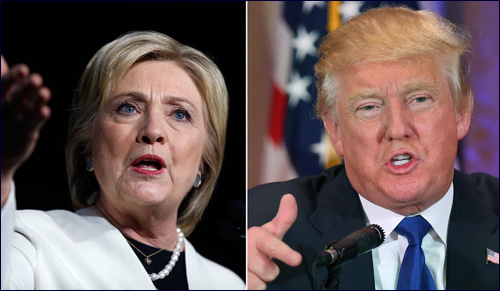 Columbia Students Once Rallied Against Nazis — Now They Cheer for Them
Columbia Students Once Rallied Against Nazis — Now They Cheer for Them


7 min read
Like it or not, Hillary Clinton or Donald Trump will be elected the 45th president of the United States of America. Here’s how we can prepare.
The most remarkable thing about the failed coup in Turkey last week is how utterly unremarkable it actually was. While this particular coup was unsuccessful, since 1960 Turkey has been overthrown four times through takeovers organized and perpetrated by its own military.
Much more remarkable than Turkey’s latest coup attempt is that in its 240 years, America has never experienced anything similar. One of the most wonderful reflections on our great country and its citizens is that no matter how vociferous and strident the debates and campaigns, when the final ballot is counted and a new president is elected, he or she is the undeniable, undisputed leader and Commander in Chief.
When George W. Bush served as president, he garnered great opposition and disapproval, but nobody of consequence seriously suggested or attempted to overthrow him. Over the last eight years President Obama has garnered tremendous discontentment and vocal disagreement, but not a coup or a takeover.
Which brings us to this coming November 9th, the day after the coming presidential election. Like it or not, ecstatic or deeply depressed, unless something extraordinary occurs, Hillary Clinton or Donald Trump will be elected the 45th president of the United States of America. He or she will not be the president just for the percentage of the population that votes for them. He or she will be the president of every single American, no matter how distasteful or repulsive that may be for those who will vote for the losing candidate or perhaps don’t vote at all.
Elections consistently bring out rigorous debate and raucous disagreement. However, this election feels particularly negative due to the fact that only a minority of Americans actively like either of the candidates.
How will we overcome the polarization that is rapidly and increasingly developing before our eyes?
A recent ABC News/Washington Post poll shows that 6 out of 10 Americans describe themselves as dissatisfied with the choice between the presumptive nominees. That means that most people cannot focus on what they like about a candidate, only about how they dislike and distrust the other candidate more. This reality breeds a culture and atmosphere of even greater rhetoric, contentiousness, and name-calling among the electorate than usual. Rather than advocate for their candidate, most people simply cannot imagine voting for the other candidate and have lots to say about those who can.
Recent elections of all sizes, from president to state senator to local school board, have brought out a lack of civility and caused great damage that remains long after the polls close and the inauguration balls conclude. The decibel level of the debates and the personal attacks in the discussions around Shabbos tables, at kiddushes in shul or at the gym have led to the breakup of friendships, and to families whose members can barely tolerate one another.
If that was true in the past, what will be left in the wake of this upcoming election? How will we overcome the polarization that is rapidly and increasingly developing before our eyes?
How will we resume talking to one another civilly and lovingly on November 9th when we will be living in a country being led by someone for whom many have contempt and disdain and it is the fault of the “other,” namely, those that voted for him or her?
As this election season rages on and will only grow more intense, it is not too early to be thinking about the morning after and the impact of the tone, tenor, and vocabulary of the conversations we are having now.
Others are entitled to see things differently and to share their point of view without fear of being slandered or of being slammed.
Certainly we are entitled to, and to some degree have a responsibility to, make our voices heard, to express our concerns, criticism, and critiques. It is a hallmark of this great republic and a foundational principle of democracy that we debate freely and advocate unreservedly. But nowhere in our law books or in our traditions does it mandate that we call people with whom we disagree names or question their character to make our point. Indeed, at the core of our democracy is the recognition that others are entitled to see things differently and to share their point of view without fear of being slandered or of being slammed.
The Talmud (Berachos 58a) states, “Just as the faces of people do not exactly resemble one another, so too their opinions do not exactly resemble one another.” What is the comparison between faces and opinions? Rav Shlomo Eiger (1786-1852) explained that we would never become exasperated or disturbed that someone’s facial features are different than ours. We wouldn’t condemn or criticize someone for having different color eyes or hair than we do. We implicitly recognize that everyone is created differently and it is our differences that weave the wonderful tapestry of our interconnected lives. Similarly, we should recognize that everyone’s opinions are the result of their being created differently and raised differently. Just as someone is entitled to look different, so too are they entitled to think differently and approach things differently without harsh disapproval or condemnation.
Our practice of taking three steps backward at the conclusion of the Amidah comes from the Talmud (Yoma 53) which states, “The one who prays must take three steps back and only then pray for peace.” R’ Menachem BenZion Zaks explains that we cannot pray for, nor achieve, peace if we are not willing to step back a little and make room for others and their opinions, their tastes and personalities.
After stepping back, we ask “oseh shalom bimromav,” God, please bring peace, and we turn to the right and to the left. Explains R’ Zaks, achieving peace and harmony means bowing towards those on the right of us and those on the left of us, not just straight ahead on our path.
Maintaining the capacity and the will to bow towards those on the right and left of us religiously, politically, and in every other way is a prerequisite to the peace we claim we desperately seek and yearn for.
While America has never experienced an overthrowing of its government, we the Jewish people twice experienced foreign bodies invading our land, destroying our Temples, and dispersing us into exile. When analyzing the underlying cause, our Rabbis did not provide a political or military reason, but rather suggested a spiritual source. We practiced sinas chinam, baseless hatred: intolerance, incivility, coarseness, and hyper criticism of one another. In an environment and atmosphere of hate, the house of love and Godliness simply could not continue to exist.
Bow towards people with whom you disagree in a bid for a friendship and a family loyalty that transcends our differences.
We know (Yerushalmi, Yoma 1:1) that in every generation in which the Temple is not rebuilt, had it existed it would have been destroyed. In other words, two thousand years later we continue to embrace a legacy and culture of sinah, of hate and disdain.
We are at the beginning of the Three Weeks, the period designated on our calendar to introspect and contemplate the Jewish condition, its causes and its roots. Rav Avraham Yitzchak Kook famously said, “If we were destroyed, and the world with us, due to baseless hatred, then we shall rebuild ourselves, and the world with us, with baseless love – ahavas chinam.”
Over the next three weeks and continuing through the election and beyond, before each conversation we have let’s ask ourselves will this topic, my opinions, and the way I am expressing them contribute to repairing the world with baseless love or destroying it with baseless hatred. Why even participate in conversations with others on topics in which we know we disagree strongly and in which the most likely outcome is not one of us convincing the other, but rather a bitterness and hostility between the two?
So if you can’t understand for the life of you how someone could support the candidate or the ideology or the lifestyle on your right or on your left, take a step back and make room for their opinions anyway. Bow towards them in a bid for a friendship and a family loyalty that transcends our differences. Doing so may just finally bring the elusive peace we are so desperate for.
